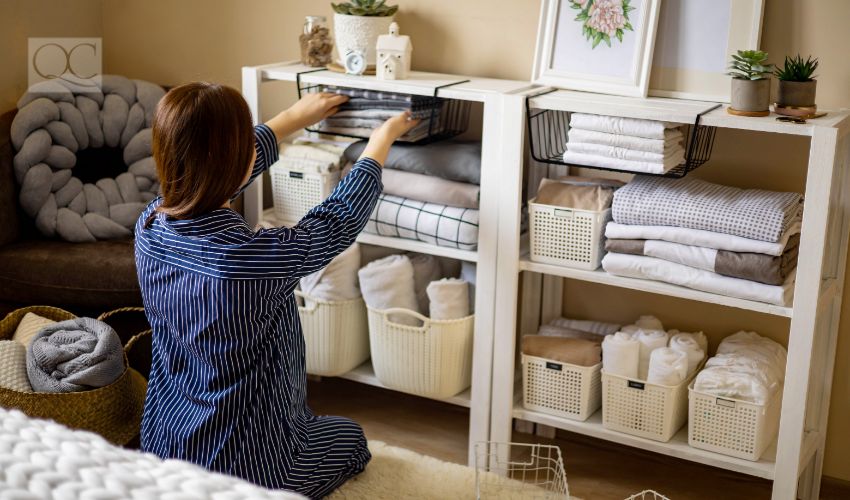What is a professional organizer? What exactly do they do? How much do they make? In this article, we’ll answer all of these questions and more!
So, stick around to learn all about this exciting career path in the design industry. Who knows – you may just discover that it’s the perfect job for YOU!
Thinking of a career in professional organizing? Here are 5 signs that you’re destined for it!
First Thing’s First: What Is a Professional Organizer?
In a nutshell, professional organizers help people get and stay organized. This might mean decluttering and organizing a home or office. Furthermore it also involves developing systems to make everyday tasks easier, or helping someone manage their time more effectively.
Essentially, professional organizers are problem-solvers! After all, they have to be able to use their creativity and expertise to develop tailor-made solutions for their clients’ unique needs. And while the day-to-day duties of the job can vary quite a bit, there are some commonalities that all professional organizers share.
What Is a Professional Organizer Called?
A professional organizer is also commonly referred to as a:
- Personal Concierge
- Decluttering Specialist
- Time Management Expert
- Productivity Consultant
No matter what you call them, one thing is for sure: professional organizers are in high demand! In fact, the industry is growing at a rapid pace – and has been for years. According to Statista, the home organization market was valued at approx. $10.3 billion dollars back in 2020 – which was a 4 billion dollar increase from its value back in 2005.
Moreover, every year since, the value of the professional organizing market has continued to increase! Data Bridge Market Research, for example, has forecasted that from now until 2029, the industry will grow another 4.70%!
This growth is largely due to the fact that our lives are only getting busier and more hectic. As a result, people are increasingly turning to professional organizers for help managing their time, space, and belongings. What this means for YOU is that there will be plenty of opportunities to break into the industry and find success as a professional organizer!

What Does It Mean To Be A Professional Organizer?
So, what does it mean to be a professional organizer? Well, first and foremost, it means being organized yourself! After all, you can’t very well help your clients get organized if you’re not organized, too.
In addition to being organized, professional organizers must also be excellent communicators and have superb people skills. This is because a lot of the job involves working closely with clients – often in high-pressure situations.
Moreover, professional organizers need to have a good understanding of design principles. This is because a large part of the job involves coming up with aesthetically-pleasing ways to organize spaces.
And last but not least, professional organizers must be patient and empathetic. This is extremely important, as some clients may be resistant to change or struggling with letting go of certain things.
Now that we’ve answered the question, “What is a professional organizer?” let’s move on to discussing the job duties…
What Is the Job of a Professional Organizer?
As we mentioned before, the job of a professional organizer can vary quite a bit from one day to the next. However, there are some common tasks that all professional organizers perform.
For example, most professional organizers will spend a lot of time decluttering and organizing spaces. This might involve anything from sorting through clothes to reorganizing an entire office.
In addition, professional organizers often develop systems and processes to help their clients stay organized. This might involve creating custom labels or coming up with new ways to store things.
Another aspect of the job might involve working with clients to help them manage their time more effectively. For example, you may help teach your clients how to make a daily schedule, or assist them with prioritizing their tasks.
To get an even better idea of what a pro organizer does on a regular basis, this article breaks down what a typical day is often like for them!
What Qualifies You As a Professional Organizer?
Now that we know a little bit more about what professional organizers do, you might be wondering what qualifies you to become one.
In short, there are no formal qualifications required to become a professional organizer. Meaning, you don’t technically need to have any training or certifications in order to work in this field.
But don’t get it twisted – you’ll be doing your career a MAJOR disservice if you go in without proper training. The fact is, the most successful pro organizers out there have taken the time to get a thorough background in design, psychology, and/or business.
This is why we strongly recommend starting your journey by completing a reputable certification course, such as the one offered by QC Design School. By having a credible certification and designation on your resume, you’ll be able to show your clients that you’re a true professional who takes their job seriously. Not to mention, this will do wonders in terms of your ability to attract and book clients!

QC Design School’s Professional Organizing Course
In case you’re interested, let’s talk a little bit about the Professional Organizing Course offered through QC Design School. To start, QC Design School is a faculty of QC Career School, a pioneer of online learning since 1984, and proudly holds an A+ ranking with the Better Business Bureau. QC’s courses are wildly popular because they’re not only offered online, but also entirely at the preferred pace of the student!
The program itself is 5 units long. In it, you’ll learn all about the following:
- The professional organizing industry
- Roles and responsibilities of an organizer
- Common factors that create organization issues for clients
- How to produce home design plans (e.g., floor plans, elevation, isometric drawings, etc.)
- Relevant design concepts (e.g., balance, visual weight, how to read a floor plan, etc.)
- Movable vs. fixed storage solutions
- The art of decluttering
- Strategic furniture placement
- Critical listening, communication, and selling skills
- How to deal with client conflict
- How to develop effective, long-term organization solutions
- And more!
Additionally, the final unit of this online course deals entirely with business training! As such, you’ll discover how to set up (and launch) your own company. You’ll also learn how to set up insurance for your business, market yourself, research industry standards, price your services, and so much more!
As the final cherry on top, once you graduate, you’ll be able to walk away with an internally-recognized certification + designation. This means you can showcase your Advanced International Organizing Professional (AIOP) proudly AND use it to sell your business to more customers!
Want to learn more about QC’s Professional Organizing Course? Check out the full course page here and get started today!
The Professional Organizer Salary
As far as salary expectations go, professional organizers can expect to earn an average of $50 per hour. Of course, this number will vary depending on your experience level and location.
For example, if you’re an entry-level pro organizer in small town, you can expect to earn closer to $30 per hour. If you’re an experienced organizer in a large city, on the other hand, you can easily charge $100+ per hour.
It’s also important to note that most professional organizers are self-employed and work on a contract basis. Should you follow this path, this means that you’ll be responsible for your own taxes, health insurance, etc.
With that being said, many organizers choose to set up their own LLCs or other business entities in order to help manage these expenses. If this is something you’re interested in, be sure to do your research and speak with a professional (e.g., an accountant, lawyer, etc.) before moving forward.
Examples of Average Annual Incomes
Now, you probably want a better idea of the type of money you can potentially make. We get it! So, are some of the salary ranges earned annually in the following example countries:
- United States: Between approx. $42,723 USD and $55,352 USD per year (Source: Salary.com)
- Canada: Between approx. $35,000 CAD and $67,000 CAD per year (Source: Glassdoor)
- United Kingdom: Between approx. £19,759 GBP and £24,162 GBP per year (Source: SalaryExpert)
- New Zealand: Between approx. $41,599 NZD and $46,745 NZD per year (Source: SalaryExpert)
- Australia: Between approx. $40,172 AUD and $56,189 AUD per year (Source: SalaryExpert)

Factors That Can Impact Your Salary
As you can see, there’s quite a range when it comes to salaries for professional organizers. So, what factors will impact how much money you make? Here are a few key considerations:
- Your experience level
- The size of the city/town you live and work in
- The type of clients you work with (e.g., residential vs. commercial)
- Whether or not you’re self-employed or work for a company
- The types of services you offer (e.g., one-time decluttering vs. long-term organization)
- Whether you offer in-person services, virtual services, or a combination of both
- Whether you offer additional design services on top of professional organizing (e.g., interior decorating, home staging, etc.)
The truth is, there are many different factors that can impact your salary as a professional organizer. Just remember that, no matter what, you have the potential to earn a great income doing something you love!
Types of Professional Organizers
Now that you know a little more about what professional organizers do and how much they can earn, let’s take a look at the different types of organizers out there. Here are a few of the most popular…
Home Organizers
Home organizers work with clients to declutter and organize their living spaces. This includes (but is not limited to) rooms like kitchens, bedrooms, bathrooms, closets, garages, etc.
Commercial Organizers
Commercial organizers work with businesses to help them get organized. This might involve organizing office space, setting up filing systems, developing storage solutions, managing inventory, etc.
Time Management Specialists
Time management specialists help clients make the most of their time by teaching them effective time management techniques. This might involve developing schedules, setting priorities, creating to-do lists, etc.
Relocation Specialists
Relocation specialists help clients move homes or businesses. This includes tasks like packing/unpacking, organizing the move itself, setting up the new space, etc.
Estate Organizers
Estate organizers work with clients who are going through a life transition, such as the death of a loved one. This might involve sorting through belongings, dealing with paperwork and legalities, distributing possessions, etc.
As you can see, there are many different types of professional organizers out there! No matter what your interests and skills are, there’s sure to be a type of organizing that’s perfect for you.

How To Find Professional Organizer Jobs
If you’re interested in becoming a professional organizer, the next step is to start looking for jobs. Here are a few places you can look:
- Online job boards (e.g., Indeed, Monster, Craigslist)
- Professional organizing companies
- Self-employment (e.g., start your own company)
If your goal is to run your own business, you’ll need to take a much more hands-on approach to finding clients. This might involve networking, advertising, and/or other marketing activities.
Once you’ve landed a few jobs, it’s time to start building your client base. Remember to always deliver quality services and exceed your clients’ expectations. With hard work and dedication, you’ll be well on your way to a successful career as a professional organizer!
Pro Tip: Check out our Ultimate Guide on starting a professional organizing business (from scratch) for more helpful tips and advice!
Helpful Resources To Bookmark
Now that you know a little more about professional organizing, here are some useful resources you can bookmark for later:
- The ULTIMATE Guide to Becoming a Professional Organizer
- MORE Than Putting Things Away: What a Certified Professional Organizer Does
- 5 Mistakes That’ll Hurt Your Professional Organizer Salary
- Finding Professional Organizer Jobs: How To Network Like a Pro
- 3 Reasons You Need Professional Organizer Training
- How To Become a Professional Organizer: Dos and Don’ts
- How To Market Your Professional Organizing Services To Small Businesses
- 4 Emotional Skills You Need To Be a Professional Organizer
- Hoarding: When Do People Seek Out a Certified Professional Organizer?

Conclusion
We hope this article has helped you understand what professional organizers do and how to become one. If you have any questions or would like more information, please don’t hesitate to contact us directly!
And remember: if you’re feeling overwhelmed by the thought of becoming a professional organizer, just take it one step at a time. Before you know it, you’ll be an organizing pro!
Do you have any tips on becoming a professional organizer? Share them with us in the comments below!
Happy organizing! 🙂


